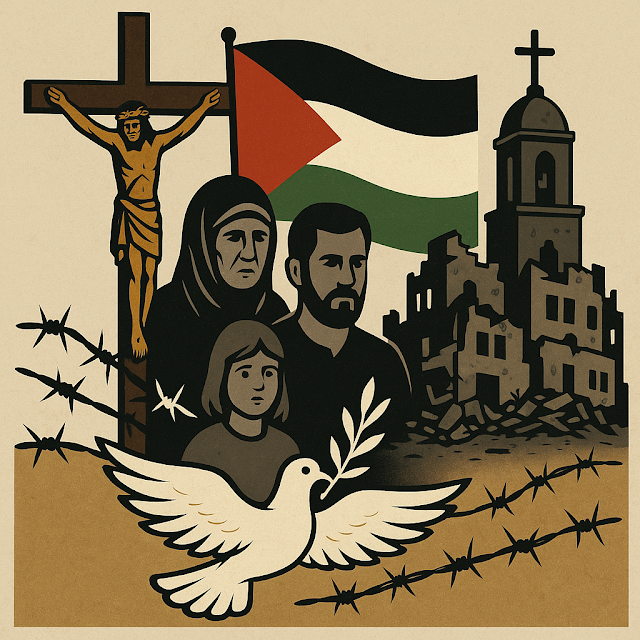This Is Another Reason I Am Catholic: Real Authority, Apostolic Succession, and the Limits of Evangelical Leadership
This is another reason I am Catholic: because I believe that if God truly established one Church to carry His authority on Earth, it wouldn’t be invisible, fractured, or improvised. It would be visible, unified, and divinely structured. That Church would speak with clarity. It would have global reach. It would still be standing after 2,000 years.
And it does. It’s the Catholic Church.
The Pope is not just a religious leader. He is the successor of Saint Peter, appointed by Christ to lead the Church: “You are Peter, and on this rock I will build my Church” (Matthew 16:18). He occupies the most enduring office in human history. His authority isn’t invented—it’s inherited through Apostolic Succession. That alone sets the Catholic Church apart from every denomination and independent ministry in the world.
By contrast, Evangelical and non-denominational pastors operate outside of that divine framework. They may have strong preaching, emotional worship, and authentic zeal—but they lack what matters most: legitimate spiritual authority passed down from the apostles themselves.
The Pope vs. the Pastor: One Rules from Apostolic Legacy, the Other from Charisma
Being Pope is like being the President of a global spiritual nation. You surrender your personal life. You don’t decide where you live, what you eat, or where you go. Everything is provided for you, but at the cost of total self-sacrifice. You are no longer just a man—you are the visible head of Christ’s Church on Earth.
The Vatican is a sovereign state. The Pope addresses heads of state, issues encyclicals that shape global ethics, and speaks to 1.3 billion Catholics. He has real influence—not through politics or wealth, but through apostolic authority. When he speaks on faith and morals in communion with the bishops, the Church listens—and the world often pays attention.
In sharp contrast, most Evangelical and non-denominational pastors serve in obscurity. Their influence is usually limited to a local congregation. They are not part of any historical chain of leadership. They have no institutional structure behind them, no global body in communion, no magisterium, no shared creed, no sacraments instituted by Christ flowing through Apostolic hands.
Most are self-appointed or congregation-appointed. Their “ordination” is not sacramental, nor is it linked to the original Church Christ founded. They can start a new church anytime, anywhere, with no authority but their own sense of calling. As Protestant theologian Carl Trueman once admitted:
“Evangelicalism, especially in its independent and non-denominational forms, has no center of gravity... It runs on personality and platform, not office.”
(First Things, 2021)
Apostolic Succession: The Unbroken Chain
One of the clearest marks of the true Church is Apostolic Succession—the unbroken line of bishops from the apostles to today. As St. Irenaeus wrote in the 2nd century:
“It is possible, then, for everyone in every church, who may wish to know the truth, to contemplate the tradition of the apostles... which has been made known throughout the whole world.”
(Against Heresies, Book III)
Evangelical churches don’t just lack succession—they often reject it altogether. Their teachings are derived from private interpretation of Scripture, not the living Tradition passed down from the apostles. Their ministries arise from movements or reactions, not divine commission through the Church Christ instituted.
That’s why the Catechism of the Catholic Church says clearly:
“The sole Church of Christ... subsists in the Catholic Church, which is governed by the successor of Peter and by the bishops in communion with him.”
(CCC 816)
This isn’t arrogance—it’s clarity. Unity and authority are not optional extras; they are marks of the Church.
Sacraments and Spiritual Power
Catholic priests don’t just preach—they act in persona Christi. Through ordination, their souls are permanently configured to Christ. They don’t merely symbolize forgiveness or communion; they bring it about through the sacraments.
Evangelical pastors can preach the Gospel, but they cannot absolve sins in confession (John 20:23), or consecrate the Eucharist (Luke 22:19), or anoint the sick sacramentally (James 5:14–15). They cannot administer true sacraments because they do not possess apostolic orders. Their ministry is spiritual in intention, but disconnected from the supernatural graces Christ entrusted to His Church.
The sacraments are not optional rituals—they are the ordinary means God gives us for salvation. Without them, Christianity becomes a well-meant philosophy rather than a supernatural encounter.
Unity vs. Division
Jesus prayed “that they may all be one” (John 17:21). He didn’t found thousands of loosely affiliated ministries competing for followers. The Catholic Church is one, holy, catholic, and apostolic—not in theory, but in visible reality.
Evangelicalism is marked by fragmentation. There are over 30,000 Protestant denominations. Even within Evangelical circles, churches split constantly over doctrine, music style, leadership preferences, or cultural issues. Truth becomes negotiable. Authority becomes local. Unity becomes impossible.
But the Church Christ founded is not divided. It is one body with one head.
Final Word: Why I Am Catholic
This is another reason I am Catholic: because Christ didn’t leave us a book and walk away. He established a Church. A visible, authoritative, sacramental Church—built on Peter, governed by the apostles and their successors, and sustained by the Holy Spirit.
The Pope sits in the chair of Peter. The bishops follow the line of the apostles. The sacraments flow from Christ Himself. This isn’t man-made authority—it is divinely conferred.
No other Church has this.
No other pastor has this.
No other voice speaks for God with the authority Christ gave to His Church.
And that’s why I will remain Catholic.





